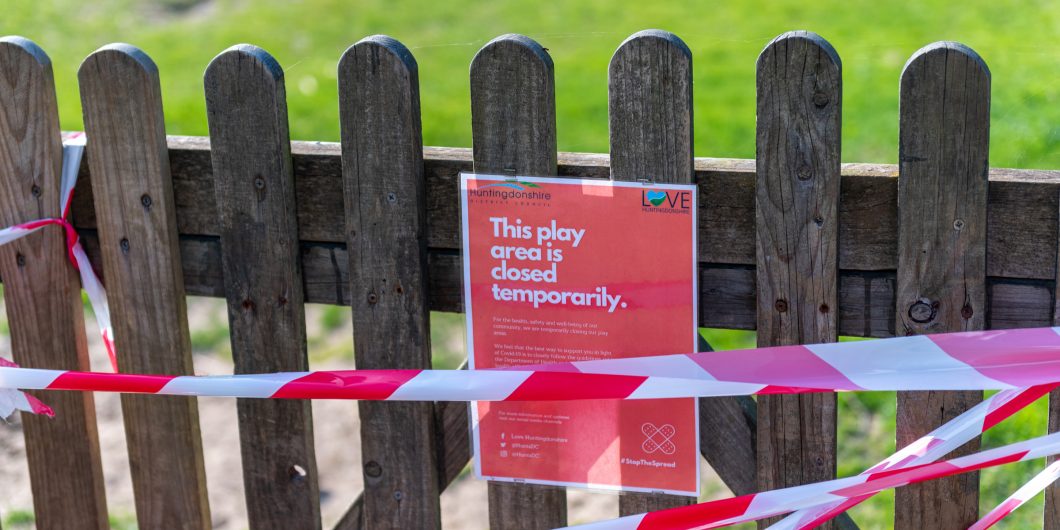The question is not the existence of tradeoffs, but whether the necessity of making tradeoffs will be honestly acknowledged or dishonestly denied.
Embodying Courage in Covid’s Wake
Lawrence Garbuz lost the Coronavirus lottery. He was one of the first New Yorkers to contract Coronavirus through “community spread.” Somehow Garbuz contracted the virus in February of last year, but because he had not traveled recently, he never seriously considered the possibility that he might have Covid-19. By the time he figured it out, he had already functioned as one of the “superspreaders” who ignited a devastating outbreak in America’s largest city. Mayor Bill de Blasio tweeted his personal information to the entire city, ostensibly in an effort to warn possibly-infected people. For weeks afterwards, the Garbuz family was excoriated and ostracized. The mailman even refused to bring their letters, until the family officially complained.
Garbuz was not alone. Many people over the past year have been shamed and ostracized for getting Covid-19, or for failing to comply with social guidelines in some particular way. A florist was inundated with abusive emails and phone calls after someone posted a picture on social media showing crowds around her business. College students were blackballed and doxed for partying over Spring Break. People lost friends, and even livelihoods.
Running Scared
Why couldn’t we get a grip? The Covid-19 pandemic has certainly been serious, claiming half a million American lives to date, but it has hardly been an existential threat to our entire civilization. About 600,000 people die annually of cancer in the United States, and we mourn this as a tragedy, but most of us are able to get through a week without flying into a panic over the MSG in Chinese food. Why was this so different?
Uncertainty was part of it. Cancer is at least a familiar threat, which has been with us for all of recorded history. Covid-19 was new, and in the early days of the pandemic, we simply had no sense of how bad the crisis might get. Would the whole thing turn out to be a media-hyped triviality, or should we all be drafting our wills? Would our economy be devastated for the foreseeable future, or would normalcy soon reassert itself? Nobody knew. We occupied that uncomfortable space in which we had somerelevant information, and a lengthy list of precautionary measures that might reduce risk to some unknown extent. The problem could not just be fixed, however. Because we were able to do something, no one could ignore questions of moral responsibility, but neither could we throw aside our other personal responsibilities until the disease was brought to heel. Hard ethical questions seemed to penetrate every menial detail of our lives. It’s hardly surprising that some people came unhinged.
There was another piece to this puzzle, however. As a health crisis, the Covid-19 pandemic hit a particularly vulnerable point in the modern psyche. It forced us to think in new ways about the limitations and vulnerabilities of the human body. As it happens, modern people are quite confused about bodies.
Alienation from the Body
Perhaps it seems strange to make such a claim, when science has revealed so much about the body that our ancestors did not know. Once upon a time, doctors practiced bloodletting to purge evil humors, and today we can do open heart surgery, or remove brain tumors without killing the patient. Surely, modern medicine is a marvel for which we should be fervently grateful.
It is. Its gifts come at a cost, however. Technological advance, as we should now understand, is a two-edged sword. It can avert suffering and death, and unlock human potential in miraculous ways. At the same time, it can alienate us from fundamental truths, and from venerated customs and traditions that once gave meaning to human life. Most relevant to the present case, technology can even alienate us from the body itself.
Social conservatives tend to think a great deal about this problem, insofar as it relates to sex, fertility, and human reproduction. The Sexual Revolution presents one clear case in which medical and moral realities, once closely conjoined in custom and culture, have been pulled apart. Thoughtful traditionalists like Mary Eberstadt and Janet Smith have written at length about this, explaining how technological advance (especially artificial contraceptives) have alienated us from our bodies, to the point where we now see reproductive health as a kind of problem requiring a technological fix. That fix changes the way in which men and women relate to one another. This is a particularly consequential case of body-alienation, but the general problem goes well beyond sex and fertility.
The human body has many limitations, and even its positive potentialities can be immensely burdensome to us at times. Most of us prefer a quick fix to pain, hard work, or a patient acceptance of our natural limits. Even if we don’t personally have that preference, our physicians or insurance companies may. It’s very common for people to find that their insurance will cover antidepressants, opioids, or cesarian sections but not talk therapy, pain-management clinics, or the midwife-supervised homebirth.
Admittedly, the line between healing and enhancement is often quite fuzzy, and it’s understandable that we sometimes prioritize a targeted objective over some philosophy of holistic health. Still, insofar as these fixes remain an endemic feature of modern life, alienation from the body will remain a chronic problem. We no longer have a clear sense of what is normal, and this makes us more susceptible to bizarre fetishes, and more prone to irrational panic when a novel threat appears on the horizon.
The problem is even worse given how easy it is to neglect the body today. Historically, the poor have usually labored mightily just to secure adequatenutrition, swinging hoes or hammers or slaving over hot stoves. Among the wealthy, that exertion was less necessary for survival, but young men especially were typically expected to undergo rigorous physical training, in preparation for military service but also for manhood more generally. By contrast, we live in a time in which unhealthy food is plentiful, while relatively few jobs call for strenuous physical labor. Athletic ability is admired, but mostly as a rarified excellence; it is not expected of everyone. Accordingly, most of us eat too much and exercise too little. Today, America has reached the point where a majority of our young people are ineligible for military service, often simply because they are obese and out of shape.
The health-and-fitness industry is also booming, offering a bewildering range of programs and products. At the extremes, health nuts may be channeling any number of modern trends: new-age pagan religion, navel-gazing narcissism, and power-of-positive-thinking optimism. Intermixed with all of these, though, we can glimpse a deep yearning to reconnect with the physical body. The creams, cleanses, and hot yoga may help here, or they may alienate people even further from the body’s natural state. Either way, they represent a kind of flip side to the epidemic of obesity and lifestyle-related disease. Both speak to a culture that is struggling to recover a grounded sense of the body’s natural state.
Returning to Temperance and Courage
Pandemics can be harrowing for a body-alienated society. Already, we were unused to taking responsibility for our own bodily health. Already we were inclined to regard public health authorities with a special reverence, like our post-modern Sons of Levi. The Covid-19 crisis upped the ante on all of this. Predictably, all Covid-related disagreements were quickly politicized, which enabled fraught disputes over mask-wearing, weddings and funerals, social justice protests, church services, and even “safe sex” to funnel back into our raging culture wars. We couldn’t regain our sense of perspective, because we’d never had it.
Courage goes beyond bodily matters, but it has a significant bodily element, which modern people are particularly inclined to neglect. Courage pushes us to endure difficult things for the sake of the good. Not all hardships involve the body, but if we can cultivate physical discipline in ourselves (and in our children), that will help us to habituate this virtue in our lives more broadly.
What do people do when they feel daunted by moral and metaphysical realities that are beyond their comprehension? They latch onto superstitions, which can dispel the terror of ignorance by supplying a putative explanation. They invent fetishistic rituals, which offer people the reassuring sense of being in controlFinally, they look for scapegoats, hoping that the community can be restored once the true malefactors have been punished and ostracized. In the panicked response to Covid-19, we see significant elements of all of these.
Are there better ways to cope with the fear and uncertainty of a pandemic? For most of us, the best solution might be a renewed appreciation of the two ancient virtues most relevant to the physical body, namely temperance and courage.
Temperance, in the ancient understanding, is a virtue for regulating physical appetites, especially for food and sex. It counsels moderation, but to understand what that means, we need to take stock of our particular circumstances. More than any other virtue, temperance demands that we cultivate an understanding of the body’s real needs and limitations. Our sexual appetites must be disciplined so that we can honor our promises, respect the dignity of other persons, and acknowledge the body’s natural potentialities. Appetites for food and drink should be indulged in a way that is broadly consonant with the body’s needs. Temperance is a moral virtue, but its dimensions are firmly grounded in human physiology. It forces us to live within our own skin, embracing both the benefits and the limitations of being physically embodied.
Courage goes beyond bodily matters, but it has a significant bodily element, which modern people are particularly inclined to neglect. Courage pushes us to endure difficult things for the sake of the good. Not all hardships involve the body, but if we can cultivate physical discipline in ourselves (and in our children), that will help us to habituate this virtue in our lives more broadly. Modern people tend to shy away from physical challenges, not only because they are lazy, but also because they are fearful. As a society, we have a strong aversion to “unnecessary” risks, which can make us more susceptible to moral cowardice.
As a mother of five sons, I have had often had occasion to reflect on this. Many times I have been shamed for being (by contemporary standards) inadequately protective of my boys, who own pocket knives and archery sets, and are permitted to jump on trampolines, play tackle football, and handle fishing tackle. Many people clearly believe that I am either unaware of, or else indifferent to, the risks associated with these activities. In fact, I do worry a great deal about my children’s safety. No mother can watch her son dragged to the turf in a football match, without feeling her heart in her mouth. Even so, I regard it as essential for my boys’ moral development that they be permitted to do things that are both physically challenging and potentially risky. How else can they learn to value the body’s natural potentialities, and respect its limitations? I would consider it a tremendous gain for society at large if we could cultivate a general social expectation that able-bodied young men should be physically fit to the point where they could, at need, enter the armed forces at any time. The advantages could be enormous, and not just from the standpoint of national security. Young people need to learn to live within their bodies. This is clearly a real struggle for 21st century humans.
One afternoon last summer, I told my children that the challenge for the day was to make a family sojourn across our Minnesota lake. The lake opens out from our backyard. We swim in it often, and skate on the ice in winter, but the younger boys had never crossed the whole lake by themselves. I swam, and they rowed along in kayaks. It’s only half a mile, which is manageable even for my 5-year-old, but psychologically it felt like a barrier had been broken. They look out across those waters every day. Now they had crossed them. In a year when we were being reminded daily about the invisible menace lurking in every public space, this felt like a moral victory. Instead of sitting at home visualizing deadly crown-spiked spheres, we were exploring the limits of what our bodies could do. One terrible thing about the pandemic was the way it left people trapped and immobile in their dwellings. The physical constraints reinforced that demoralizing sense of paralysis, which helped the hysteria to grow. Just using the body in natural ways helped us to feel more grounded and sane.
There may be more pandemics in the years to come, and for ordinary citizens, there are limits to what we can do to be prepared. At least though, we can try to combat the alienation that leaves us supine, both physically and psychologically, in the face of this kind of threat. The human body is vulnerable, but it is also remarkable, l, and we need to learn to live with both of these realities. Infirmity and death will always be daunting. By cultivating the virtues, however, we may be able to avoid living in fear.



